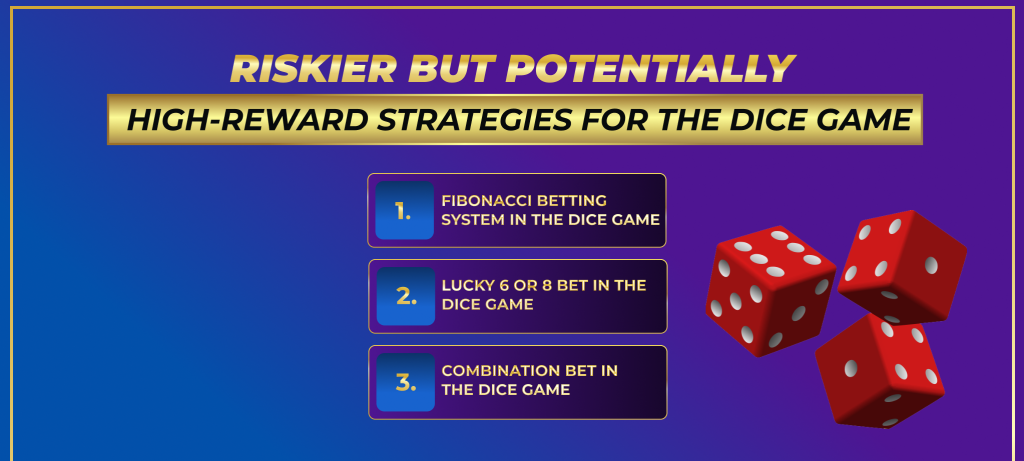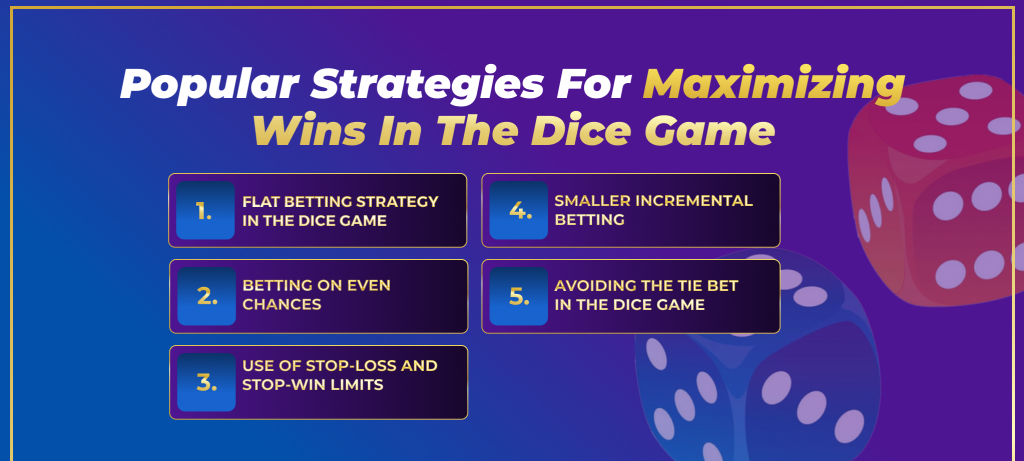
Top Strategies for the Dice Game: Play Smarter, Win Bigger
The Dice game is one of the most loved and appealing casino games that players enjoy all over the globe. It is a simple game that is still enjoyable enough for players to place bets on the outcome of a dice roll, with various betting options based on whether the numbers are single or combined. Though Dice is mostly a luck-based game, applying strategies for the dice game will allow you to make better decisions and increase your chances of winning.
It is essential to have a plan in place to manage your bets and reduce the probability of losses. When placed correctly, you can derive the greatest pleasure from the experience of gambling and get more value out of it. Nevertheless, it is crucial to recollect that the Dice game is basically a game of fortune and no strategy can make you sure of your success. Yet, learning the most effective strategies can help you decrease the risks and make the game more enjoyable.
Understanding the Basics of the Dice Game
The Dice game is a simple and exciting casino game where players bet on the outcome of a dice roll.In most versions, a single die is rolled, and players place bets on what number they think will appear or, in some cases, a combination of numbers. The goal is to predict the outcome accurately, with different betting options available based on how confident you are in your prediction.
Overview of Betting Options
- Single Number Bet: You bet on a specific number that you think will appear on the dice. This bet offers high payouts but is harder to win.
- Range Bet: You can bet on a range of numbers (for example, 1-3 or 4-6). These bets are easier to win, but the payout is lower.
- Combination Bet: You can bet on the combination of two or more numbers. This bet offers a balance of risk and reward.
3. Use of Stop-Loss and Stop-Win Limits
Set predetermined limits on how much you’re willing to lose or win. For example, decide to stop playing if you lose ₹500 or if you win ₹1000. These limits help you avoid making emotional decisions during the game and protect your bankroll.
Example:
- Loss Limit Example:
- Starting Balance: ₹1000
- Loss Limit: ₹200
- Gameplay: If your balance drops to ₹800, you stop playing for the day.
- Win Limit Example:
- Starting Balance: ₹1000
- Win Limit: ₹500
- Gameplay: If your balance reaches ₹1500, you stop playing to lock in your profits.
By using stop-loss and stop-win limits, you’re setting clear boundaries, helping to control the ups and downs of the game, and ensuring you don’t lose more than you’re prepared to. This strategy keeps your gambling experience fun and responsible.
4. Smaller Incremental Betting
Gradually increase or decrease your bets after each round depending on whether you win or lose. This helps you manage your risk while adjusting your bet size according to your performance.
Example:
- Round 1: Bet ₹50, lose ₹50.
- Next Bet: Decrease your bet to ₹40.
- Round 2: Bet ₹40, win ₹40.
- Next Bet: Increase your bet to ₹60.
- Round 3: Bet ₹60, win ₹60.
- Next Bet: Increase your bet to ₹80.
By using smaller incremental betting, you’re adjusting your bets in line with your performance. This strategy allows you to play longer while managing risks effectively.
5. Avoiding the Tie Bet in the Dice Game
Avoid betting on the tie outcome, as it usually has a higher house edge compared to other bets. A tie bet means both the Player and Banker have the same score, but the odds of this happening are much lower.
Example:
- Round 1: Bet ₹50 on “High,” win ₹50.
- Round 2: Bet ₹50 on “Low,” lose ₹50.
- Round 3: Bet ₹50 on “High,” win ₹50.
- Avoid: Betting ₹50 on “Tie” as it has a much lower chance of winning and a higher house edge.
By avoiding the tie bet and sticking with “High” or “Low” bets, you’re playing smarter and lowering your risk while improving your chances of winning over time.
Riskier but Potentially High-Reward Strategies for the Dice Game

1. Fibonacci Betting System in the Dice Game
In the Fibonacci system, you increase your bet after a loss according to the Fibonacci sequence (1, 1, 2, 3, 5, 8, etc.). After a win, you move back two steps in the sequence to reduce your bet. Consequently, this strategy is designed to help recover losses gradually.
Example:
- Round 1: Bet ₹10, lose ₹10.
- Round 2: Bet ₹10, lose ₹10 again.
- Round 3: Bet ₹20 (next in the sequence), win ₹20.
- Round 4: Bet ₹10 (move back two steps in the sequence), win ₹10.
- Round 5: Bet ₹10, lose ₹10.
- Next Bet: Bet ₹20 again, according to the sequence.
By using the Fibonacci betting system, you increase your bets after losses and decrease them after wins. This method can help manage your bankroll more systematically, but it’s important to remember it requires patience and enough funds to handle long losing streaks.
2. Lucky 6 or 8 Bet in the Dice Game
In this strategy, you place a bet on the outcome that the roll will land on a 6 or 8. These numbers are chosen because, in some dice games, they have a higher probability of appearing compared to other numbers.
Example:
- Round 1: Bet ₹50 on a 6, roll results in a 6, win ₹100 (higher payout).
- Round 2: Bet ₹50 on an 8, roll results in a 5, lose ₹50.
- Round 3: Bet ₹50 on a 6, roll results in a 6, win ₹100.
- Round 4: Bet ₹50 on an 8, roll results in a 7, lose ₹50.
By using the Lucky 6 or 8 bet, you’re betting on numbers that can offer higher rewards, but remember that it’s riskier than betting on standard “high” or “low” outcomes. It’s a strategy that requires careful consideration of when to take the risk.
3. Combination Bet in the Dice Game
Instead of betting on a single number, place a combination bet on two or three specific numbers or outcomes. This spreads your bets across multiple possibilities, increasing your chance of hitting one of them. However, it also means you’re betting on several outcomes at once.
Example:
- Round 1: Bet ₹50 on a combination of 3 and 5, roll results in a 3, win ₹150.
- Round 2: Bet ₹50 on a combination of 2, 6, and 8, roll results in a 7, lose ₹50.
- Round 3: Bet ₹50 on a combination of 4 and 6, roll results in a 6, win ₹150.
- Round 4: Bet ₹50 on a combination of 1, 4, and 5, roll results in a 5, win ₹150.
By using the combination bet, you increase the chance of winning by covering multiple possibilities. However, this strategy comes with greater risk because you’re relying on several outcomes to hit.
Managing Your Bankroll in the Dice Game
1. Set a Budget
Decide how much you’re willing to spend before you start and stick to that amount.
2. Adjust Bet Sizes
3. Know When to Stop
Whether you’re winning or losing, recognize when it’s time to walk away to protect your bankroll.
FAQ’s
1. Is there any strategy for rolling dice?
2. What is the best strategy for the dice game?
4. What is the hardest number to roll on a dice?
7. How to win a 10,000 dice game?
To win in the 10,000 dice game, focus on consistent betting, understanding the odds, and using strategies like flat betting or betting on even chances to maximize your wins.
8. Why is dice called dice?
The term “dice” comes from the Old French word “dé,” meaning a small cube, which was commonly used in various games of chance.
9. Is dice game luck?
Yes, the dice game is primarily based on luck, though using strategies can help manage risk and improve your chances of winning.
10. Which country invented dice?
Dice are believed to have been invented in ancient Mesopotamia (modern-day Iraq) around 5,000 years ago. Additionally, they have been used in various cultures and games ever since.
Conclusion
The main interesting part about the dice game is the design of strategies that are practical for you to find the right trade-off between risk and profit. Additionally, aside from the fact that the outcome is mainly a matter of fluke, carrying out the appropriate strategies will certainly better your gameplay and increase your probability of success. By being aware of the odds and handling your stakes carefully, you can make the game not only interesting but also rewarding. So, the fun of a dice game is great, and remember, clever strategies can be the ones that really matter!



